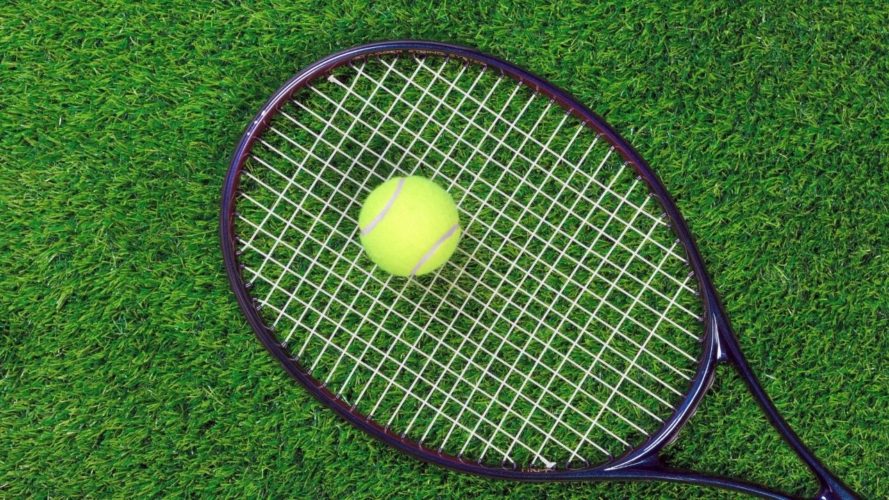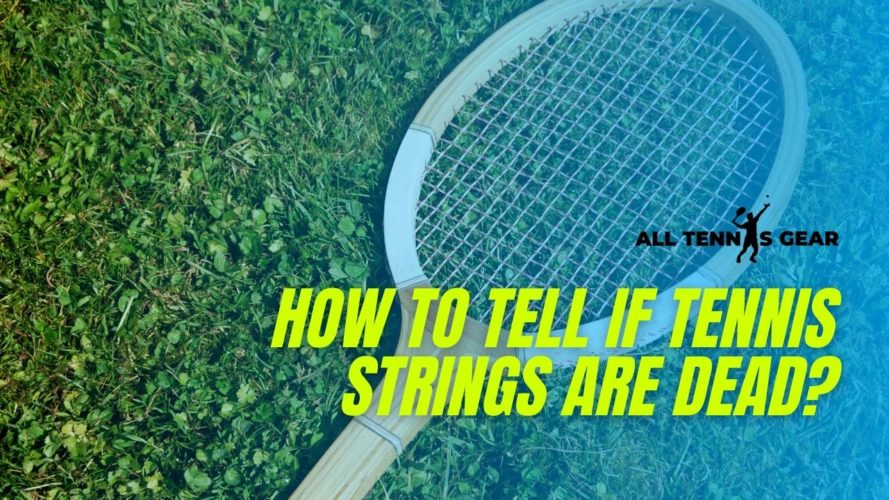How to tell if tennis strings are dead? What does that even mean? Are strings alive when we buy them? If you’ve any of the above questions, you’re at the right place.
Tennis strings are dead simply means that your tennis strings have lost their elasticity. It is not anything unusual, rather a natural event for all tennis players.
When a tennis string is dead, it cannot be used to hit the tennis ball effectively. Even after you put all of your strength on that hit, it won’t go that far.
Can you resurrect that dead string by restringing the string? It can work, but it won’t be able to deliver the same level of elasticity as before.
So, it is necessary to change dead strings with fresher ones. But, how to tell if strings are dead? Let’s find out.

How Long Do Tennis Strings Last?
There are different types of tennis strings. They all last for different periods. Other factors such as the rate of playing with them also affect the longevity of the strings.
As you know, tennis strings come in the synthetic gut, natural gut, multi-filament, nylon, and polyester.
Synthetic Gut
For beginners or any level of players, synthetic gut strings will last 2 tennis games max. Then you will need to restore it.
Natural Gut
Natural gut is the best type of tennis string. But it is also expensive and harder to maintain.
In the case of elasticity and durability, the natural gut is at the top. How long will it last before going dead? There is no fixed period. It purely depends on your usage.
If you play regularly, then it may require restringing every two days. But if you play once a week, it may need restringing once a month.
Multi-Filament
The longevity of this type of string elasticity depends on two factors. It’s material and its rate of usage.
There is no official rating on which material multifilament string lasts for how much. But you should be able to get a guess from the experts and professionals.
Nylon
Nylon is a great cheap option. However, it does not last well in the case of elasticity. As a result, it is the quickest to die.
Some nylon strings come with a wear-resistant coating. If you don’t use this type of coating on nylon string, they may die in mid-game.
Polyester
Polyester is similar to nylon strings when it comes to holding tension. Polyester will die after just one game. You will have to restore it. But it cannot perform well after three or four restringings.
In the case of all of the tennis strings, we can say that all of them require restringing after a few games. Based on your usage and style of play, they may need to rest after each round. Ever wondered why tennis players carry multiple tennis rackets in their bags? this is why.
How To Tell If Tennis Strings Are Dead?
There are many ways to know if your tennis string is dead. Some are based on scientific facts while others are based on the practical and behavioral effects of the string. Regardless, we would suggest you use two or three methods to be sure of your strings to be dead.
What are those methodologies? Have a look at it below.
1. Vibration of the Strings
Observe your tennis racket strings when it hits the ball. Do the strings vibrate/ move too much after hitting the ball? If yes, then it is a clear indication that your tennis string has lost its elasticity.
It does not necessarily mean that those strings are dead. They just need to be restrung/ retightened. They might still be used for a few rounds.
So, if your tennis racket strings vibrate too much when you hit them or put force on them, it is time to visit the store to retighten them. If they appear to be dead for real, then the experts in the shop will tell you. Then you will know for sure.
If you want to be sure by yourself, then follow the other steps.
2. Tension Loss
The higher the tension, the less force it is required to hit the ball effectively. If the tension for the strings decreases, you will need to hit the ball harder to achieve desired results.
That sounds too over the head. Don’t worry. What we meant to say is that you should make use of your practicality here. Do you have to hit the ball harder with more strength than before? If yes, then you will need to check your strings.
They may need to be restrung or they will need to be replaced. Here’s a step-by-step guide to help you restring your tennis racquet.
3. Ball Distance
This is another aspect of the tension loss methodology. If your tennis strings have lost their tension, they will not hit the ball harder. If the ball is not hit harder, then it won’t travel much distance. It is a general concept.
If the ball does not go far, then your strings are dead. Visit a racket shop to repair them.
4. String Tones
The string tone is more of a feeling than being scientific. What do you feel when you hit the ball? Is it a solid, crisp tone? Or is it a flat and dead tone?
If it sounds dead, then the strings are probably dead, or it could be the ball that is not right.
Either way, this is not much of a reliable methodology.
5. Ping and Thug Noise
This is the most popular and the most reliable method. Hit the racket strings against your palm as hard as you can. It will either produce a ping tone or a thug tone.
The ping tone indicates that the string is tightened and has sufficient elasticity, therefore not dead.
But if it is a thud tone, then the strings are dead and you will need to repair/ replace them.
So, these were the five common methodologies to tell whether your string is dead or not. Regardless, it is always wise to visit an expert to make sure that the strings are dead.
Do Tennis Strings Have a Shelf Life?
Yes, tennis strings do have a shelf life if you have strung them. But if you have stored them in the package as per instruction, they can last for a lifetime.
Take the natural gut as an example. If it is stored in a wet place with humidity, it will lose its elasticity. It will be dead for good. But if stored in a dry place with zero humidity, it can last for long.
But if you have strung it to a racket and stored it, it will lose its elasticity over time. How long? That depends on the environment and other factors.
So yes, tennis strings do have a shelf life if it is strung on a racket.
Do Tennis Strings Lose Tension?
Yes, they do. Tennis strings will lose their elasticity over time if they are string on a racket. If it was never taken out of the package, or you have stored it in the package after playing, it won’t lose its elasticity.
If you play with the strings, then they will lose their elasticity. You may think that if you string the string in the racket and place it on the wall as a decoration and never play with it, they might not lose their elasticity.
But truth be told, they will lose their elasticity. The tensile strength of the string will reduce and it will loosen up. However, they will remain playable if you restring them.
If you don’t want your strings to lose their elasticity over time, then you should take them out of the racket and store them in their packet by following all the instructions.
Which Tennis Strings Last the Longest?
In the case of longevity, the natural gut takes the crown. Natural gut strings are the most expensive tennis strings. But this high price is justified with longevity, durability, softness, and elasticity.
The natural gut strings will stay soft at their maximum tightness. You will need to restore it every month if you play regularly.
However, natural gut strings are very hard to take care of and maintain. Humidity can easily loosen the elasticity of the strings. So, if you want the next best option, then it would be synthetic gut strings.
The synthetic gut is made with different materials. But all of them have nylon. It does deliver good elasticity and performance as the natural gut. But it will break faster than the natural gut.
Conclusion
Tennis strings are elastic materials. We know that all elastic things will lose their elasticity over time. So it is of no surprise that tennis strings will go dead after playing a few rounds.
Don’t be disturbed about this matter.
Rather you should take measures of restringing your strings to bring their elasticity back. Dead strings also refer to strings that have broken. In that case, replace your strings.
It does not matter if you have the best string in the market, if you don’t take care of it, it will lose its elasticity and go dead quicker than expected. So take care of your strings.

My name is Reagen and I started AllTennisGear (earlier AllTennisShoes) as a way to share my humble experience and help new Tennis players. Thank you for spending a few minutes of your day here and know that your feedback is always welcome.
